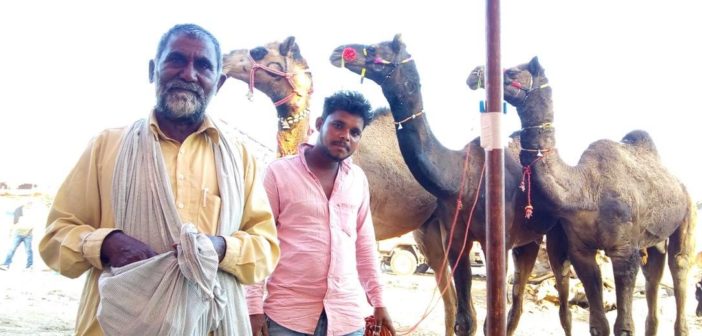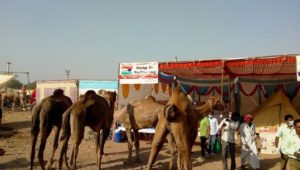The animal kingdom plays an important role in the lives of Indian people. Animals are involved in people’s economies, subsistence, rituals, and worship. There are numerous animal fairs and festivals held every year and each fair has its own significance. Pushkar Fair is one of the most popular and colorful fairs of the Thar Desert in the Indian state of Rajasthan. It’s held in the town of Pushkar every year, in the months of October and November.
Pushkar is a holy town for Hindus, located about 150 kilometers from Jaipur in Rajasthan. Pushkar is famous for its temples and ghats, and is one of the oldest cities in India. At Pushkar Fair, traders and villagers from all over Rajasthan and neighboring states gather with thousands of camels for trading. Nearly 12,000 camels, horses and steer were assembled this year from all over Northern India. Many animals and their handlers walk for days to be at the fair. Few of them use different modes of transportation, such as trucks, to bring their animals to the fair.
Animal Aid Abroad partner group Help in Suffering’s (HIS) Jaipur chapter organised a week-long, free Camel Treatment Camp at the fair from 15-22 November 2018. The team was comprised of vets Dr. Abhinav Swami and Dr Jitendar Jhingonia, with compounders Rajendra, Rajesh, Bhagwan Das, Lalchand, Vimal and Prabhu.
A total number of 548 camels were treated at the fair for various clinical problems. 229 camels were de-wormed to reduce their gastric worm load. Camel handlers were advised to repeat the de-worming at least once in the following three months to keep their camels healthy.
This year there was an outbreak of camel pox. A large number of camels were suffering seriously with fever, loss of appetite and pox lesions all over their bodies, including their heads, faces, and the mucous membranes of their respiratory tracts.
The majority of the other cases seen at the camp had gastric disturbances, which mainly included simple indigestion, along with few cases of diarrhea, colic, and impaction. Sudden changes in feed and water, stress due to the long journey and drastic temperature variations during the fair are the main factors responsible for gastric problems.
There were also a number of camels suffering from injuries such as nose peg wounds, saddle sore wounds, leg injuries, eye injuries, and punctured foot pad wounds.
Treating nose peg wound injuries was a major challenge to the team as each and every owner was explained the significance and importance of plastic nose pegs over the wooden and metal ones which cause the injuries.
Lameness was frequently observed, as people brought their camels from long distances without sufficient rest. Camels have a high risk of lameness when they walk for days or during loading and unloading when brought to the fair in trucks.
This year, 255 camels were treated for skin infections like mange and other external parasites, which was many more cases than the previous year’s camps.
There was also an outbreak of upper respiratory tract infection. Hundreds of camels suffered from the same problem, with symptoms of nasal discharge, trouble breathing, and loss of appetite.
Camels are very prone to road accidents on highways because of their invisibility during the night. These accidents usually result in fatal injuries to camels and their owners. To try and reduce the incidence of these road accidents, 320 pairs of reflectors were fixed to camel carts at the fair by the HIS team.
Approximately 1,050 leaflets were distributed to camel owners to provide education about better management practices and care for their camels. These leaflets are printed with easy to read text, and with self explanatory pictures. These leaflets are very useful to explain to owners the proper management of nose peg and saddle sore wounds, optimum weight limits, significance of reflectors and routine check-ups for the camels.
Help In Suffering and Animal Aid Abroad are thankful to all donors and supporters for making the Pushkar Fair Camel Treatment Camp possible and improving the welfare of camels at Pushkar Fair.
Featured image: camels and their handlers at the Pushkar Fair. This image, and all images in this story courtesy of Help In Suffering / Animal Aid Abroad.













